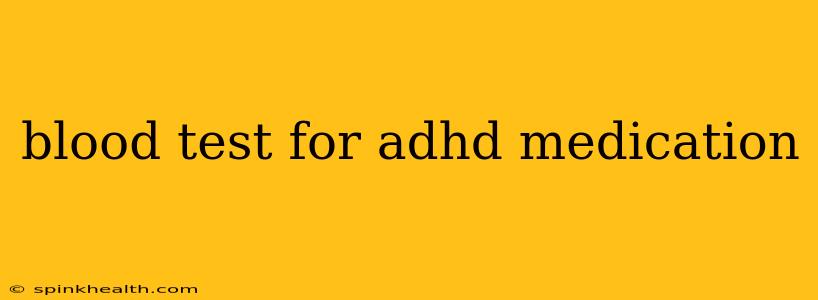The quest for effective ADHD treatment is a journey many embark on, often leading to questions about diagnostic tools. One question that frequently arises is: "Is there a blood test for ADHD medication?" The short answer is no, not a definitive one. However, the longer answer is more nuanced and involves understanding how ADHD is diagnosed and the role of blood tests in managing potential side effects. Let's unravel this together.
What is the Current Diagnostic Process for ADHD?
Imagine a detective investigating a crime scene. They don't just look at one piece of evidence; they gather multiple clues to build a complete picture. Diagnosing ADHD is similar. It's not a simple blood test; instead, it relies on a comprehensive assessment by a healthcare professional, usually a psychiatrist, psychologist, or pediatrician. This process typically includes:
- Detailed behavioral assessment: This involves gathering information about the individual's symptoms, their history, and how these symptoms impact their daily life. This often includes questionnaires, interviews with the individual and their family or teachers (if applicable).
- Clinical interview: A doctor will speak with the individual to understand their symptoms, how long they've experienced them, and the impact on different aspects of their life.
- Review of medical history: Existing medical records are reviewed to rule out other conditions that might present with similar symptoms.
- Neuropsychological testing (sometimes): In some cases, additional testing might be employed to assess cognitive functions and rule out other conditions.
This multi-faceted approach ensures a thorough understanding of the individual's condition, maximizing the accuracy of the diagnosis.
Are There Any Blood Tests Related to ADHD Treatment?
While there isn't a blood test to diagnose ADHD, blood tests can play a role in managing the treatment of ADHD. These tests are not for diagnosis, but rather to:
- Monitor for side effects: Some ADHD medications can affect liver function or blood pressure. Regular blood tests can help monitor these vital functions and ensure that medication is being tolerated safely.
- Rule out other conditions: Sometimes symptoms that mimic ADHD might actually be caused by other underlying medical conditions. Blood tests can help rule out these possibilities. For instance, thyroid issues, anemia, or sleep disorders could sometimes present with symptoms similar to ADHD.
- Identify potential drug interactions: If an individual is taking other medications, blood tests might help assess for potential interactions with ADHD medication.
Why Isn't There a Blood Test for ADHD?
ADHD is a complex neurodevelopmental disorder. It's not caused by a single identifiable factor, such as a specific gene or chemical imbalance that could be readily detected through a blood test. The symptoms are behavioral and cognitive, making them challenging to pinpoint with a simple biological marker. The current diagnostic methods focus on observable behaviors and patterns, making a thorough clinical evaluation essential.
What About Genetic Testing for ADHD?
Genetic testing is an area of ongoing research in ADHD. While some genes have been linked to an increased risk of developing ADHD, there's no single gene that directly causes the condition. Genetic testing isn't currently used for diagnosis and is not a substitute for a comprehensive clinical evaluation.
Can Blood Tests Help Determine the Right Dosage of ADHD Medication?
No. Blood tests don't directly determine the appropriate dosage of ADHD medication. Dosage adjustments are made based on the individual's response to the medication, monitored through clinical observation and regular check-ups with their healthcare provider.
What Should I Do If I Suspect I Have ADHD?
If you suspect you or your child might have ADHD, it's crucial to seek a professional evaluation from a qualified healthcare provider. They will guide you through the diagnostic process and discuss treatment options, including medication if deemed appropriate. Remember, accurate diagnosis and personalized treatment planning are key to successful management of ADHD. This process relies on clinical judgment, not on a singular blood test.

